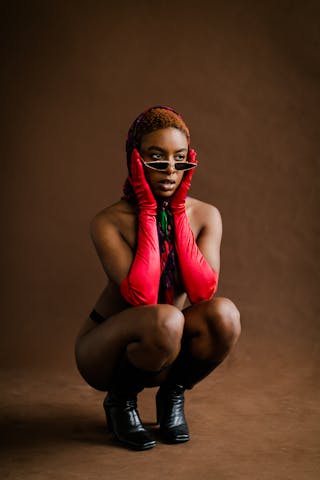I Didn't Know Abusive Same-Sex Relationships Existed Until I Was In One
Have you ever wondered what really goes on behind closed doors in unconventional relationships? It's time to unlock the secrets of a captivating and mysterious world. Take a deep dive into the intriguing world of cage kink and discover the reality that lies beneath the surface. Open your mind to new perspectives and uncover the truth about relationships that may not fit the traditional mold.
When we think of abusive relationships, we often picture a heterosexual couple with one partner physically or emotionally harming the other. However, the reality is that abuse can occur in any type of relationship, including same-sex relationships. As a member of the LGBTQ+ community, I never thought that I could be in an abusive relationship with my partner. But I soon found out that abuse knows no boundaries and can affect anyone, regardless of their sexual orientation or gender identity.
If you're looking for a new and exciting way to spice up your love life, consider exploring Seattle's alluring local sex scene by visiting this website and trying it out for yourself.
The Beginning of My Relationship
Check out the amazing deals on JAV porn sites at LusciousSex and treat yourself to some top-quality adult entertainment.
When I met my partner, I was over the moon. They were charming, funny, and made me feel like I was on top of the world. We quickly fell in love and moved in together, believing that we were destined to be together forever. However, as time went on, I started to notice subtle changes in my partner's behavior. They became increasingly controlling and possessive, always wanting to know where I was and who I was with. At first, I brushed it off as them being protective, but it soon escalated into something much more sinister.
Explore the sensual world of smoking kink and indulge in a new and exciting erotic experience.
The Signs of Abuse
I didn't realize that I was in an abusive relationship until I started noticing the signs. My partner would often belittle me in front of others, criticize my appearance, and isolate me from my friends and family. They would use derogatory language and gaslight me into thinking that I was the one at fault. I felt trapped and helpless, not knowing how to escape the toxic cycle of abuse.
The Impact on My Mental Health
Being in an abusive same-sex relationship took a toll on my mental health. I experienced anxiety, depression, and low self-esteem, all of which were exacerbated by the constant emotional abuse. I felt like I had nowhere to turn and that no one would understand what I was going through. The stigma surrounding LGBTQ+ relationships made it even harder for me to seek help, as I feared that I would be judged or dismissed.
Seeking Help and Support
It wasn't until I confided in a close friend that I realized I needed to get out of the relationship. They encouraged me to seek help from a therapist who specialized in LGBTQ+ issues, and it was the best decision I ever made. With their support, I was able to recognize the signs of abuse and gain the strength to leave the relationship. I also found solace in online support groups for LGBTQ+ individuals who had experienced similar struggles.
Moving Forward
Leaving an abusive relationship is never easy, but I knew that I deserved better. I focused on rebuilding my confidence and self-worth, surrounded myself with supportive friends and family, and sought professional help to heal from the trauma. It took time, but I eventually found the courage to love again and to be in a healthy, fulfilling relationship with someone who respects and cherishes me for who I am.
Raising Awareness
My experience has taught me the importance of raising awareness about abusive same-sex relationships. It's crucial for LGBTQ+ individuals to know that they are not alone and that help is available. By sharing my story, I hope to break the silence and stigma surrounding abuse in same-sex relationships and encourage others to seek support if they are in a similar situation.
In conclusion, abusive relationships can happen to anyone, regardless of their sexual orientation or gender identity. It's important for LGBTQ+ individuals to be aware of the signs of abuse and to seek help if they find themselves in a toxic relationship. No one deserves to be mistreated, and there is always hope for a brighter, healthier future.
- https://online-hookup-website.cactusclubsj.com/posts/work-wife-when-a-work-colleague-becomes-a-true-friend/
- https://free-hookup-site.patternismovement.com/posts/roleplay-ideas-12-sex-role-play-ideas-to-try-now/
- https://chat.fu-direct.net/posts/ghostlighting-is-the-new-dating-trend-were-already-tired-of/
- https://top-discreet-dating-sites.wsmchicago.com/posts/my-husband-and-i-defy-gender-roles-in-our-marriage/
- https://free-local-hookup-apps.warriorkingsbattles.com/posts/dakota-johnson-had-to-superglue-a-thong-on-while-filming-fifty-shades-sex-scenes/
- https://meet-women.getweps.com/posts/poor-things-sex-scenes-why-is-everyone-talking-about-them/
- https://sex-chat.getweps.com/posts/doggy-style-sex-tips-you-need-to-know/
- https://local-hookup-website.hankwilliamsmothersbest.com/posts/if-being-bisexual-was-actually-a-choice/
- https://online-local-dating-platform.prettygirlsmakegraves.com/posts/what-does-it-mean-to-be-aegosexual/
- https://top-local-dating-websites.gatective.com/posts/strapons-best-sex-toys-for-pegging/
- https://top-local-hookup-site.jershaanddup.com/posts/buy-the-corn-on-the-cob-vibrator-from-sex-education-season-4/
- https://free-local-dating-website.niklasbelenius.com/posts/butter-churner-sex-position-love-islands-callums-favourite-sex-position/
- https://top-local-encounters-websites.wsmchicago.com/posts/bondage-sex-bdsm-for-beginners/
- https://best-dating-sites.jershaanddup.com/posts/things-to-do-for-may-bank-holiday-how-to-have-a-sex-marathon/
